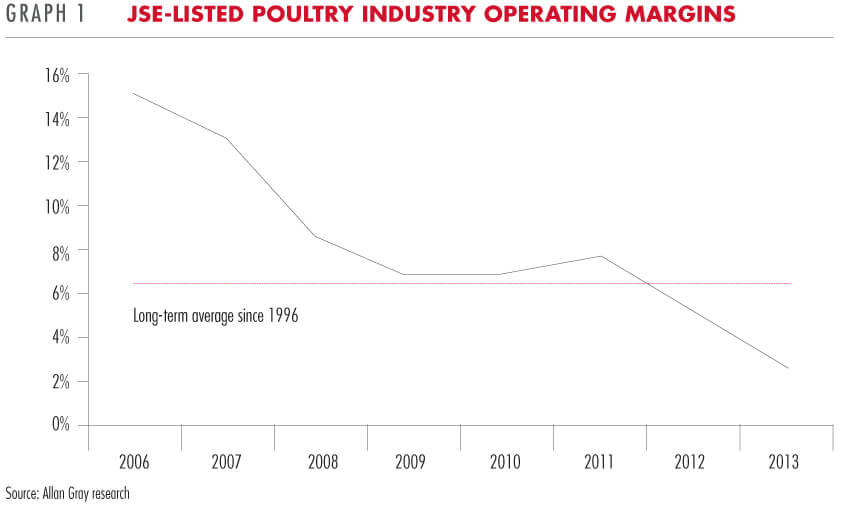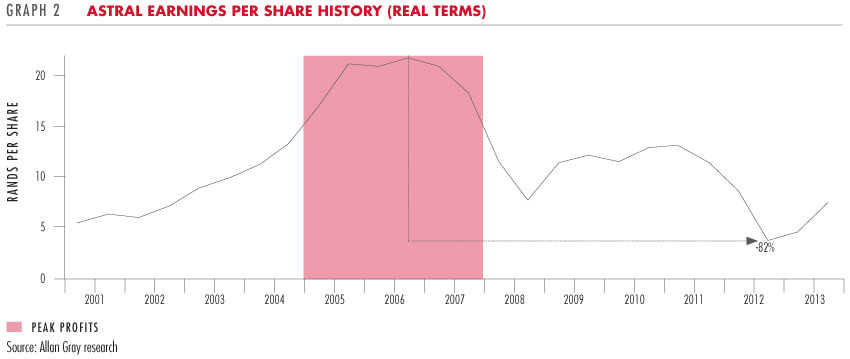Good quality companies at decent prices are hard to come by these days on the local market. Leonard Krüger explains the investment case for Astral Foods.
Readers of the financial press will no doubt be aware of the plethora of woes the South African poultry industry has experienced in recent years. This is clearly illustrated by the decline in operating margins of the largest poultry producers listed on the FTSE/JSE All Share Index (ALSI), as shown in Graph 1.

For some time now we have been of the opinion that the average profitability of local companies is above their long-term growth trend line. Coupled with price-to-earnings ratios above 18x, quality companies, with current profits below our estimate of normal, at a decent price, are almost as scarce as chicken teeth. However, Astral Foods fits this description and is a holding in our clients' portfolios for the reasons highlighted below.
Quality operations
1. Scale and efficiency
With well over four million chickens produced every week, Astral is one of SA's largest poultry producers. Rearing, feeding and processing such quantities from three production hubs results in significant benefits of scale. Higher utilisation of assets, lower per-unit fixed overhead costs and increased bargaining power and reach with suppliers and customers equates to an efficiently run operation.
2. Integration leads to lowest-cost producer
As an integrated producer, Astral manages the full life cycle – from the laying of eggs to getting fresh chicken on supermarket shelves. This not only adds to greater efficiency and lower overall costs, but also allows Astral to make a profit by, for example, selling feed to its broiler operations. Meadow Feeds is a high-quality operation with excellent returns on capital, highly predictable customer demand and a low risk of technological obsolescence.
3. Free cash flow and strong financial position
Astral has a proven track record as a great generator of free cash flow (FCF). We define FCF as the cash remaining in a business after paying all interest, tax and investments in working capital and capital expenditure. Since listing in 2001, almost two-thirds of Astral's declared accounting profits have translated into FCF, while at the same time, sufficient investments have been made into the business to grow revenue per share by a compound 9% per annum. This FCF has been applied substantially to pay dividends and buy back shares over this time as acquisitions have been kept to a minimum.
The group carries minimal debt and does not speculate in commodity hedging activities.
4. Management and capital allocation
Astral's focused and stable leadership team has been instrumental in the group's ability to navigate the difficulties faced by the industry. Management has resisted the temptation to diversify away from the company's core competence and, thanks to its healthy financial position, Astral has been investing in its operations at a time when its competitors are struggling to stay afloat. These investments will further enhance Astral's long-term competitive position relative to local peers, in our opinion. We like management's rational approach to return-focused capital allocation, cost control and opportunistic expansion activities.
Below-normal profitability
Competition from imports, a weak local consumer environment and increasing input costs have materially impacted the profitability of Astral (and the industry as a whole). However, there are reasons to be optimistic.
Recent declines in the global and domestic price of inputs such as maize and soya beans bode well for poultry producers. Such inputs constitute up to 60% of Astral's total costs.
Meanwhile, a significant capital project at the group's Standerton production hub has been completed. This will result in new efficiency savings, in-sourcing of previously procured feed volumes and additional capacity at the lower end of the industry cost curve.
Added to this, it appears likely that the government will impose tariffs on imported poultry products, deemed to constitute dumping. While we have a strong preference for free markets wherever possible, this does seem to be a true case of unfair competition. Leveling the playing field for local producers is necessary to ensure a return to health for an industry that closely aligns with some of the key objectives of government, such as raw material beneficiation, rural development and large-scale employment of lower skilled employees.
Although we do not believe that the peak profits of 2005-2007 will be repeated anytime soon in real terms, we think current profits are below normal for a business that is the leader in its industry (see Graph 2).
